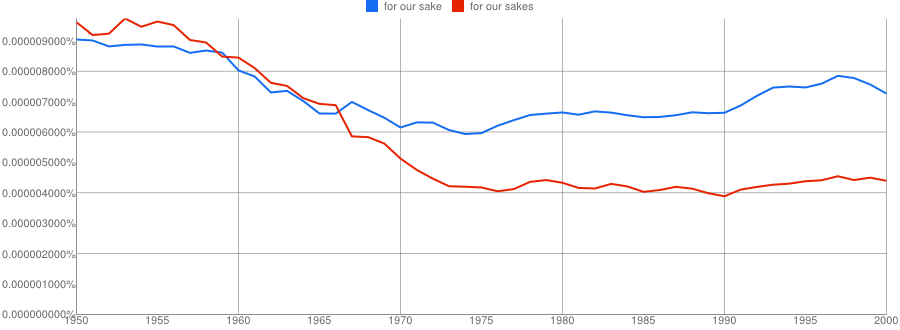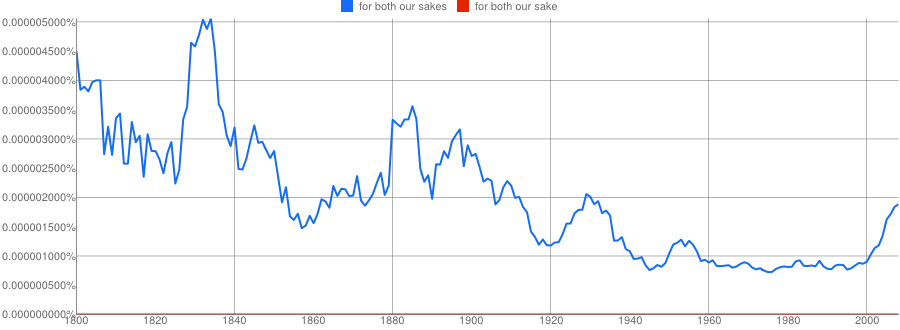Should sake be pluralized in this usage?
For both our sake, I'm going to leave now.
For both our sakes, I'm going to leave now.
Yes, the word sake can be pluralised. For both our sakes sounds a lot more natural than for both our sake. You can also say for all our sakes.
Of just 53 hits in Google Books for "for both our sake", some are actually "for both our sake's", whereas "for both our sakes" gets 84,000 hits. Forget logical analysis - just go with the majority!
But... note that (as @Peter Shor says) in OP's example it's the word both that puts the kibosh on the singular. Without it, the modern trend is increasingly to say for our sake

("for our sakes" was actually the more common form a century or two ago, if you want to look)
It doesn't appear that "for both our sake" (with singular sake) is ever used. (Ngram for both our sakes vs. for both our sake; corpus English; 1800-2008.) I agree with FumbleFingers -- go with the majority.

You can't say "both our singular noun". For example, while "both our houses" is correct, it necessarily refers to two houses. If you want it to refer to one house, you either have to leave out the both and say "our house" or say "the house of both of us".
So the choices you have are:
for the sake of both of us,
for our sake,
for our sakes,
for both our sakes.
I would say that logically it should be "for both our sakes" because "sake" is plural in this sentence. However, maybe grammatical logic is sometimes illogical as in "for our family's sake" because there is only one family although there are obviously several people in a family.... However, having written this I am unsure about the answer...
Linguistic meaning- and grammar-based analysis time.
I think it's: well....
Because: 'of' does not have to be omitted. In many phrases in English where 'of' is followed by a noun phrase, 'of' is being optionally deleted. (Think 'all the time' / 'all of the time). Interestingly, 'both' and 'all' are both quantifiers. Anyhow, this results in 'our sakes' being a noun phrase (the preposition 'of' is followed by a noun), 'sakes' being the head noun, 'our' being the possessive determiner. So, do we want the noun 'sake,' meaning 'a reason for wanting something done.' Now, think of phrases like 'for the sake(s) of our family' where 'sake' can be replaced with words like 'love,' or 'respect,' (non-count nouns) or countable nouns like 'financial situation(s)' or 'financial wrongdoing(s).' Grammatically, in terms of agreement, we are free to choose a non-count, singular, or plural noun. (side note: also keep in mind that the determiner /definite article 'the' in this instance carries some meaning/specificity with it as well.) Anyhow, is 'sake' countable? The answer is yes, 'sake' is countable. Check an English-learner dictionary. (http://www.learnersdictionary.com/search/sake) Now, let's go back to our original phrase 'for both of our sake(s)' and replace 'sake' with any other noun. (Think 'for both of our car(s)' / 'for both of our heart(s) / 'for both of our happiness' / 'for both of our treasure(s) / 'for both of our kitchen(s)) And ask yourself if the noun needs to be singular or plural. If we own whatever a 'sake' is, do we own it exclusively or do we have joint ownership in it (which is necessary to answer because of the word 'both)? Well, think of a kitchen; it's owned by me, but how can you own my kitchen if we're two co-workers comparing kitchen renovations that each of our husbands are working on (at our own, non-shared homes)? Leaving 'kitchen' singular in this instance makes it illogical, but choosing an abstract (and uncountable) item like 'happiness' is fine--but we need an abstract, countable noun. What other abstract, countable, plural noun can we logically both own? 'For both of our misgiving(s),' 'for both of our fault(s),' 'for both of our shortcoming(s),' or 'for both of our decision(s)' come to mind. Which leads me to my first conclusion: 'for both of our sakes.' with the plural '-s' seems to win. But I also think we are used to having these abstract, countable nouns used singularly (after a plural determiner) in some other instances. (Think 'This is/These are our fault(s).' / 'This is/These are our decision(s)'). Tough call. Why can I say 'This is our fault,' These are our fault,' and 'These are our faults,' but not 'This is our faults? 'Both' and 'These' demand the same plural agreement.